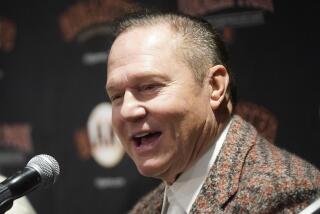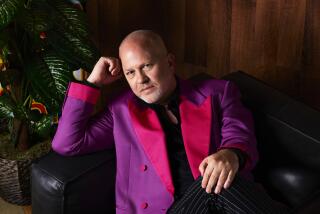Verdict May Hinge on Agent’s Game Plan
He was the most persistent job seeker the firm had ever seen. He telephoned continually, had friends and family send unsolicited letters of praise and underscored his determination by writing a mock Sports Illustrated story -- his smiling face on the cover -- predicting his success.
More than anything, Brian G. Murphy wanted to be a sports agent. And thanks to his persistence, he landed the job of his dreams three years ago at Steinberg & Moorad Sports Management, one of the premiere sports agencies in the country.
Now the 32-year-old Murphy is the firm’s anti-hero, a central figure in its nasty $40-million civil court case against upstart rival Athletes First, of which Murphy is chief operating officer. By his own hand, Murphy not only tarnished his onetime mentor, super-agent Leigh Steinberg, but he may have unwittingly undermined his own company.
An eight-person federal court jury is expected to begin deliberations today on accusations that Athletes First and its chief executive, David Dunn, a former Steinberg partner, used proprietary information to steal more than 50 football player clients from Steinberg’s firm. The suit also contends that Murphy and Dunn tried to keep Steinberg from fighting back with threats of blackmail. (Murphy himself is not a defendant in the case, though he is in arbitration with Steinberg’s firm in a separate proceeding.) Dunn has countersued.
Although the six-week trial has been marked by testimony from such football stars as Super Bowl quarterback Drew Bledsoe, the jury’s decision may hinge on Murphy’s actions surrounding the February 2001 office coup that tore Steinberg’s firm apart and led to the breakaway agency.
The evidence shows that Murphy was an architect and recording secretary of the rebellion.
One key memo, labeled “attorney-client privileged information,” calls Steinberg an alcoholic, a professional fraud and a man with lots of embarrassing secrets “that could prove to be useful in negotiating a settlement.”
“The truth is this whole ‘mutiny’ could destroy his career,” Murphy wrote. “If we wanted to, we could rip apart his marriage, his reputation and his career.” The mere prospect of such exposure, Murphy said, would “drive Leigh insane.”
He appended an outline of necessary steps to leave the firm that included salary information for players, copies of client files and “incriminating evidence against Leigh” and his business. Yet another memo, called “Game Plan,” counted down the tasks that needed to be completed in the week before the mass defections over the Presidents Day weekend.
What Murphy did not anticipate was that his writings would become public. Murphy composed them on his laptop computer while working at the Steinberg firm. After Murphy left, his old boss hired a computer forensics expert, who recovered the memos and numerous e-mails from the hard drive. The presiding judge ruled they were fair game because Murphy wrote them on company property and thus had no reasonable expectation they should be private.
Steinberg’s lawyers say the documents are the Rosetta stone of their case and reveal Murphy’s overweening ambition.
“In a way, for Murphy to become the super-agent, he had to destroy the super-agent,” said Franklin Brockway “Brock” Gowdy, lead attorney for Steinberg’s firm, who Friday referred to the documents repeatedly in closing arguments.
Defense attorneys, meanwhile, have labored to portray the documents as the work of a justifiably disgruntled employee who was abused by his boss and ultimately failed to execute many of the finer points of his writings. In an interview, Murphy said he intended to show the most controversial memo -- the one that mentioned driving Steinberg “insane” -- only to his attorney. He added that he regrets the disclosure has hurt Steinberg’s standing.
“I’m about as loyal as you get,” Murphy said. “I was loyal to Leigh, through thick and thin. Until it got to be too much.”
Murphy was far from the most polished job applicant knocking on the door of Steinberg’s Newport Beach firm in the late 1990s. But he was, by all accounts, the most determined.
A frustrated jock since childhood, Murphy said he nursed the dream of being a sports agent while moving through the University of Notre Dame and Harvard Law School. He wouldn’t let go even after taking a job as an aspiring Boston labor litigator.
So he jumped at the chance when a law school chum called in 1998 to report that Steinberg had posted an ad at Harvard looking for “the next Jerry Maguire,” a reference to the hit movie loosely based on Steinberg’s life. Murphy launched a months-long siege that included paying his own way to Steinberg’s 1999 Super Bowl party in Miami.
“He set the all-time record in terms of the amount of times that he called us and wrote us,” Steinberg testified during the trial. “He sort of wore us down.”
What put him over the top was the mock Sports Illustrated. Part spoof, part confessional, the article depicted Murphy as a future super-agent with an office overlooking the Pacific and a heart filled with gratitude for the firm that gave “me my first opportunity and taught me everything along the way.”
But within months after starting in May 1999, disillusionment set in. He testified he took an $80,000 cut in pay and moved his pregnant wife 3,000 miles from her family, only to find a “dysfunctional” office where bosses screamed and their over-educated underlings fetched laundry or chauffeured athletes.
Murphy plowed ahead. Within a year he was coordinating the recruitment of rookie football players and serving as Steinberg’s assistant on special projects. Between meetings and errands, the job was a blur of golf tournaments, dinners, bar-hopping, strip clubs and hangovers in a quest to cozy up to young athletes, or “kids,” according to Murphy’s sketchy diary, which was admitted into evidence.
As time passed, his hopes began to dissolve into frustration. He said Steinberg was more interested in promoting himself than recognizing the contributions and talents of others.
The teacher and the student began to clash. Murphy reworked recruitment materials, downplaying Steinberg’s role, a change that angered him. Steinberg challenged Murphy’s recruiting expenses.
The final falling-out came last January when the firm failed to sign first-round draft pick David Terrell of the University of Michigan. Murphy had been coordinating the ill-fated effort. Murphy said Steinberg threw his keys at him, kicked a television and stormed out of his office; Steinberg admitted in testimony that he was angry.
Testimony has established that after the resignations Murphy did call an official for Assante Corp., the Canadian-based parent of the Steinberg firm, and discussed the prospect of damaging personal information about Steinberg coming out. The Assante official testified it was blackmail. Murphy said he was merely pointing out the bad press that would befall everyone if a lawsuit were filed.
Whatever the truth, Murphy’s comments seem prophetic. Murphy has undergone 63 hours of depositions and testified in court for two days. In his diary, he refers to associates as “idiots” and reveals his own drinking problem.
The proceedings themselves have further frustrated his goal for joining Steinberg’s firm in the first place: to become a sports agent who can negotiate contracts for football players. Murphy said he was scheduled to attend an NFL Players Assn. seminar this summer and take the test to become a certified contract advisor.
But the union heard about his involvement in the litigation and raised questions. Murphy withdrew his application.
“No one,” he said, “has escaped from this process unharmed.”
More to Read
Go beyond the scoreboard
Get the latest on L.A.'s teams in the daily Sports Report newsletter.
You may occasionally receive promotional content from the Los Angeles Times.










